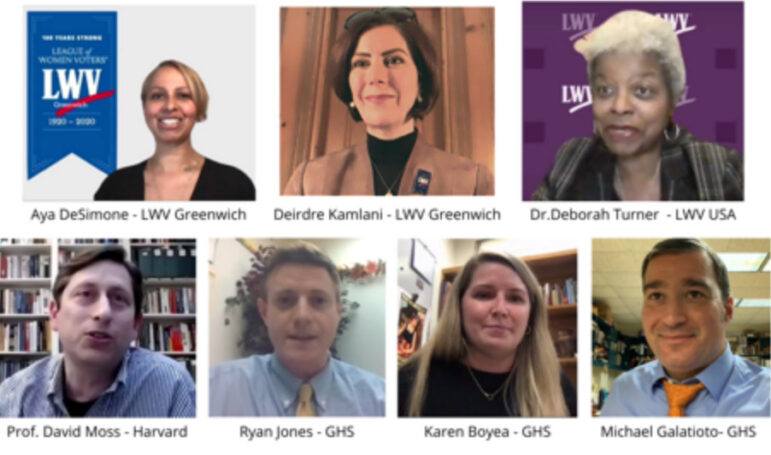On Tuesday Greenwich High School teachers Karen Boyea, Ryan Jones and Michael Galatioto moderated the Greenwich League of Women Voters’ Fourth Annual Harvard Case Discussion.
In honor of the League’s centenary celebration, the night’s topic was the long struggle for women’s rights, from the suffrage movement to the fight over the Equal Rights Amendment. The event was co-sponsored by the Greenwich Historical Society and Greenwich Library.

First launched in 2017, this inter-generational community event has consistently been one of the League’s most popular. This year, the Greenwich League extended invitations to other League chapters and high school teachers across the US who joined the project in 2019 and 2020. And, as in past years, students and teachers from Greenwich High School, Brunswick, Greenwich Academy and Sacred Heart participated too.
Two hundred people joined from every region of the country via Zoom; they all read the Harvard case in advance and came prepared to answer questions and participate in a broad-ranging discussion about this important episode in American democracy.
Special guests included Harvard Business School Professor, David Moss; League of Women Voters of the US President, Dr. Deborah Turner; ERA Coalition Board Member, S. Mona Sinha; and case co-writer and former GHS student, Rachel Wilf.
The GHS teachers who moderated the case were all nominated to study under Professor Moss in the case method by the Greenwich League starting in 2017. During the event, they demonstrated their skill
in using this interactive teaching approach, bringing a discussion that would normally be held in the confines of their classroom to a larger, national audience. They led a fast-paced and substantive conversation about women’s suffrage and the continuing struggle for ratification of the ERA. Both students and adults actively participated and debated important questions around the timing of the 19th amendment, why (or why not) an ERA was necessary and how they might have voted on the ERA if they were a state senator.
According to Karen Boyea, AP US History and Honors Civics teacher, “For the past three years, I have been fortunate to be able to teach using the case study method, which elicits high-level thinking and fosters student engagement. I am thankful to the League of Women Voters to have had the unique opportunity to co-moderate a community discussion.”
AP Government and Honors US History teacher, Ryan Jones, who partnered with Ms. Boyea on leading the discussion added, “The case method encourages students and community members alike to push themselves as they grapple with the evolving concept of democracy, which is at the heart of each case.”
The event was unique in that it brought together a select group of students from local Greenwich high schools in a virtual classroom, along with adults from Greenwich and around the country. Brunswick Academic Dean and AP US Government teacher, John Booth, commented, “My sense is that this event makes students feel special. They are entrusted to talk about an important intellectual topic. The level of discourse says, ‘Hey, this is a serious topic, we are going to dig into it in a serious manner, and you are
bright enough to do this.’” Booth noted that the event’s “secret sauce” was the unique way it allowed people of all ages to converse about an issue of importance to our democracy.
For the first time this year, Sacred Heart Greenwich also sent a group of students to participate, although SHG Global Scholars Director, Judy Scinto, has been involved with the project since 2018. She remarked, “As someone who was taught using the case method in grad school, I know it’s a tall order because the material is demanding. But it was so exciting to see how well all our students prepared and met the moment. They learned so much about the role of women’s voices within the context of the ERA, and I was very proud of their ability to jump into a high-level and engaging dialogue.”
Professor Moss reminded everyone that constructive conflict has always been part of our political process, allowing for different perspectives and interests to be accommodated in a marketplace of ideas. “Democracy in America has always been a contact sport,” he observes. “American democracy has survived and thrived from one generation to the next on the basis not principally of harmony but of conflict—sometimes intense conflict—mediated, generally, by shared ideals.”
For those who are concerned that this conflict has taken a negative turn in our politics today, Moss stresses that the key to ensuring constructive conflict, rather than destructive conflict, is to sustain a strong culture of democracy. While there are disturbing signs that the nation’s culture of democracy has weakened over recent decades, he reminded everyone that it can be revitalized, including through stronger history and civics education and through public discussions like the one on Tuesday night.
Survey data consistently shows that those who participate in the project’s case discussions exhibit a stronger commitment to democracy, including to voting, political engagement and a willingness to debate constructively with those having an opposing political view.
Greenwich High School has sent more teachers to train under Professor Moss in the case method than any other high school in Connecticut. According to Deirdre Kamlani, League board member and Civics Chair, “The Greenwich League began its collaboration with the Case Method Project in 2017, and since that time, the project, which is now a standalone institute, has been immensely successful, expanding its footprint to 45 states and the District of Columbia. As part of that effort, 64 League chapters have already involved nearly 100 teachers from 26 states, and these numbers are expected to grow dramatically over the coming years.”
Any League member or high school teacher interested in getting involved with the project should contact Deirdre Kamlani at [email protected]. More information is available on the LWV Greenwich website, www.lwvgreenwich.org.